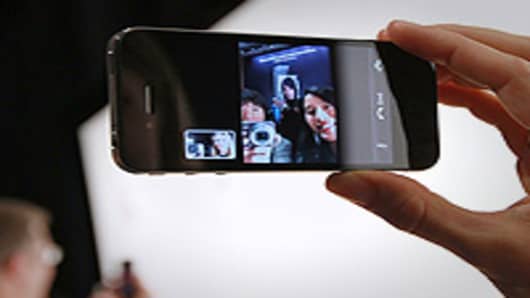When it comes to Apple and the iPhone launch, and even AT&T , it turns out you really can argue with success.
I've been reading article after article, post after post, pundit after pundit, caterwauling about the glitches and snafus connected to the iPhone 4 launch; and the ongoing complaints about AT&T's inability to keep up with the whiz kids in Cupertino who seem to come up with ways daily to tax the company's overburdened networks.
Call this a version of Apple's own theory of relativity.
Yes, there may have been problems with supply, and yes some of the phones might have signal strength issues, screen display issues, camera issues. And if this were a normal product release from a normal company in normal circumstances then all of this might indeed add up to a problem for Apple.
Relatively speaking, all of this might end up being blips on the screen, yellow-ish or otherwise. Apple managed to sell 1.7 million iPhones in less than three days. Stores across the country are sold out. Oh, and all those phones need to be activated as well.
Apple has never sold this many of anything in such a short period of time, ever! And likewise, AT&T has never had to activate so many handsets in such a short period of time, ever. Relative to other product launches, with far less volume and far more issues, Apple's iPhone release was hardly the disaster some blogs and critics might suggest.
Instead, Apple ought to be patting itself on the back for a job well done.
A job "well" done, but hardly "all" done. There may be phones to replace. There may be software to create to solve some of the issues discussed. But without any real hard data yet as to how many phones are truly suspect, we're still dealing with anecdotes and not market research. There's a difference. A YouTube video showing a glitchy camera on a single phone (that I've been unable to duplicate, by the way) isn't evidence of a widespread product failure. Don't confuse the volume of a complaint with the volume of problems out there in the marketplace. Such is the power, however, of the blogosphere.
I've read the criticisms of Apple, that maybe it rushed the iPhone to market, that it can ill afford troubled releases like this one again, but I'm not buying it. Why? Because millions of consumers are buying anything Apple. The trouble for Apple, and for AT&T as well, is that they're doing all that buying all at once. That's enough to stretch the capabilities of any company. Unlike product releases of the past where Apple has limited production to create that release-date frenzy of short supply and over demand, this time around, Apple had a huge inventory of phones available and still managed to meet the need on day one. Or came much closer than it had in the past.
I was outside the company's Palo Alto store, where the line stretched around, and around, and around the block and never seemed to let up all day long. And yet, each one of those thousands of people walked out of the store with activated iPhone 4 in hand. And that scene played out all over the country. When you think about the logistics of the Apple Inc. supply chain, and the enormous consumer base it must address, the global distribution it has to navigate, the complexity of its products, there are bound to be problems. I don't want to be an apologist for Apple and I'm sure the folks who received an iPhone that needs to be fixed are justifiably frustrated. But this product release was an event of gargantuan proportions and Apple is addressing the issues. Maybe not as quickly as some of these customers would like, but quickly nonetheless.
What's funny is watching other companies, particularly Nokia ; try to capitalize on Apple's perceived problems (see Nokia's corporate blog with instructions on how to properly hold your Nokia phone, poking fun at the iPhone antenna problem), only to have new YouTube posts showing the same problem plaguing Nokia phones as well.
Same goes for Verizon , and Sprint , and T-Mobile and others constantly berating AT&T for the poor performance of its network.
I don't deny that AT&T has serious problems. During a recent drive from San Francisco to San Jose, my call dropped 6 times before I passed by SFO! OMG! But before these guys cast stones at AT&T, consider the enormous load this network has to shoulder, thanks to huge number of activations with iPhone 4, all its iPhone predecessors, the iPad 3G, and all the other handsets AT&T is supporting. Again, not being an AT&T apologist. Just calling attention to the realistic challenges these companies face as they try to scale platforms and devices in a time-frame and magnitude no company has ever really had to deal with before.
It's not the adversity that defines a company. It's how the company deals with it that becomes the real legacy.
Apple is more successful today than it ever has been. Lines will continue to form. Apple will continue to do the best it can. Every company craves the problems Apple is suffering. Craves the problems that AT&T is suffering. They are problems. They are being addressed. Competitive criticism getting lots of attention masks the true sentiment underneath: I know we're talking Apple, but this is really all about sour grapes.
Questions? Comments? TechCheck@cnbc.com


